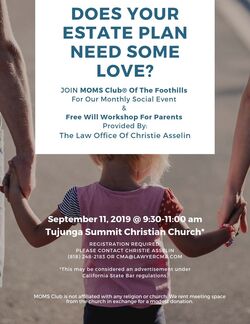|
I look forward to seeing you at Estate Planning Meeting #1! Please be sure to upload the following documents to Clio at least two days prior to our meeting.
If you have any other investment or business interests that may not be triggered by any of the above requests, please let me know. For a long time, avoiding the federal estate tax was a big concern; however, given that the threshold for the federal estate tax is currently very high, the likelihood of most of us ever being liable for federal estate tax is quite low. This, of course, does not mean that estate planning isn’t beneficial. Estate planning is still a great way to avoid probate, and to have your affairs in order and organized. What is the current tax rate? In 2019, the current federal estate tax is 40%. This is quite high; however, so is the exemption. The current exemption is $11,400,000. Thus, is a person passes in the year 2019, s/he receives a tax “coupon” of $11,400,000. This amount is subject to annual change. The Tax Act, which sets forth the gift and estate tax rate, and exemption, is subject to sunset January 1, 2026. As of 2026, the exemption reverting back to $5,000,000 unless further action is taken by Congress. There is much debate about whether Congress will take any other action. Time will tell. What is the gross estate? The gross estate includes all real and personal property in which the decedent had an interest. It also includes things such as annuities, the value of the decedent’s share of a joint estate, and life insurance proceeds (even though payable directly to the beneficiaries). What is the adjusted gross estate? After the value of the estate’s gross estate is determined, its value is adjusted for deductions such as funeral expenses, and expenses incurred in the administration of the estate. The federal exemption or “coupon” of $11,400,000 is then applied. So, for most of us, our taxable gross estate will be 0. Despite this, estate planning is an important tool for a lot of other reasons such as avoiding probate, ensuring your assets go where you would like them to, and ease the burden for loved ones. Let me know if I can assist you in any aspect of your estate planning. I am happy to schedule a complimentary 15 minute consultation with you. 5/13/2019 Digital Assets And Estate Planning – What Anyone With An Email Address Or Social Media Account Needs To KnowRead Now What are digital assets? The term sounds really quite sophisticated. But, digital assets are commonplace. A digital asset in an electronic asset that is associated with the right to use, usually in the form of a username and password. Given their medium, digital assets are slightly different than most assets. They are highly regulated by state and federal law. Without proper planning, those regulations can cause problems when it comes time to administer an estate. How common are digital assets? Very! Common examples include: • Social media: Facebook, Twitter • Digital photos, images and videos (such as the photos stored on your iCloud account) • Email: Gmail and Yahoo • Bank accounts and other financial accounts • Airline miles Less common but still run-of-the mill for many of us who have our own businesses, include certain income-generating digital assets: • Monetized YouTube channel, blog • Social media influencer accounts • Income generating blogs • Intellectual property (patents, copyrights, trademarks) • Domain name and websites • Client lists Often loved ones left in the wake of a death need to take pragmatic steps such as paying bills, or even accessing emails to invite friends to their relative’s funeral. Problems arise when loved ones lack login credentials or consent to access these accounts. Having a digital asset plan in place can really assist loved ones in taking these steps. It’s a best practice to include a list of digital assets, along with username and password information. For a list of CNET’s best password managers, click here. Digital asset custodians are absolute sticklers when it comes to protecting these accounts because of the many federal and state laws at play. Federal law prohibits service providers from releasing the content of digital assets without the account holder’s prior consent. A person who has passed away is obviously unable to give that consent anymore. So, without proof of that consent, a loved one may have to request a court order to gain access. For example, should a relative pass away you may want to simply shut down their email accounts or iCloud accounts. Hackers prey on inactive accounts. So, it’s a best practice to place an account into inactive status, or the equivalent. Or, perhaps you simply want to access family photos that are stored on the iCloud. The language included in an estate plan in which a deceased person has granted express consent to a particular person may be all that is needed for a loved one to access the deceased person’s email or iCloud account. With some estate planning, digital assets can be accessed by loved ones. It’s one more piece to the estate planning puzzle that is not discussed often enough, and impacts all of us. How To Protect Your Digital Assets There are some simple steps that certain providers offer their users. Certain providers such as Facebook and Google offer legacy plans which allow specific individuals, designated by you, the ability to manage and /or memorialize the account of a deceased person. As great as the option is; however, even the legacy planning provides some limitations. After the death of a loved one, you may be able to memorialize an account, but the provider may not allow you access the content of those accounts. And, of course, these plans are only offered by a limited number of providers. To read more about Facebook’s legacy planner, click here: To read more about Google’s legacy planner, click here: Please contact me for a complimentary consultation to discuss your options with regard to this aspect of estate planning. 5/8/2019 What Is Typically Included In An Estate Plan (Part 2): Advance Health Care Directives & Property ManagementRead Now Unfortunately, there are instances when people are simply unable to make decisions for themselves as a result of incapacity. This incapacity could be because of old age or a medical condition. Advance Health Care Directive (also sometimes referred to as a “living will”) – This document allows you to designate a loved one to act on your behalf with regard to medical decisions. This document may also contain information regarding your end-of-life care. You do not need an attorney to create an advance health care directive. There are many forms available. My preferred form is published by The Regents of the University of California, and can be found here: https://prepareforyourcare.org/advance-directive-state/ca. There are a couple of other documents that are related to advanced health care directives such as a do-not-resuscitate form (“DNR”) and a Physician Orders for Life-Sustaining Treatment (“POLST”). A DNR informs medical providers that a patient does not wish to receive CPR if there is a medical emergency. A POLST, is an order which specifies specific medical wishes as to: 1) CPR; 2) use of a ventilator; or 3) artificial nutrition. In general, these documents are not typically recommended for young, healthy people. Durable Power Of Attorney For Property Management/Finances – Similarly to the above, this document allows you to designate a loved one to act on your behalf with regard to management of your finances and property. This document is useful even when a person is temporarily incapacitated such as in the event of a hospital stay. As your agent, your loved one will be empowered to write checks on your behalf, and manage your assets for you. Typically, your agent will be empowered to do things such as: filing and paying your taxes, transferring property into a trust, managing your investments, and filing legal actions on your behalf. You can set forth your wishes as to when this power will take effect – either upon signing or upon an event springing the document into effect like incapacity. You can speak to your attorney about what is best for you. Drop a line if you are interested in learning more about how I can assist you with this aspect of estate planning. Your beneficiary designations are critical to a good estate plan. But, they are often overlooked! Combined with the right estate plan, these two factors can really organize your financial affairs. Also, the good news is that you don’t even need an attorney to designate your beneficiaries or payable on death (“POD”) designations. All you need to do is contact your financial institutions so that your account will simply pass to your designated beneficiary or POD designation. So, for instance let’s say you have been married for a while. But, maybe you haven’t had a chance to update the beneficiary on your life insurance. So, it still names your sister and brother as beneficiaries. Let’s also say you recently had a baby. And, maybe that life insurance beneficiary is still set to your brother and sister. If you pass, your spouse and young child will not receive those benefits. They will pass directly to your sister and brother. Well, that’s probably not what you planned. That's probably not even what your sister or brother would want either. Let’s say that instead, you list your beneficiaries like this:
This way, your life insurance proceeds will pass directly to your spouse. If s/he isn’t around, then it will go directly to your child. The last case scenario, passing those benefits to your trust, would apply if neither of those options are available. Your trust is available to guide your loved ones as to your wishes. In this example, without this plan and a trust, your loved ones will not have any guidance, and may have to seek court guidance. Court guidance = attorneys, attorney’s fees, paperwork and waiting. We want to avoid that. A trust will help you to avoid that. This is just one example of how the right beneficiary designations and estate plan can work together to keep as much coin in the family bucket, so to speak. Interested in seeing how an estate plan can help you or your family? Please contact me for a complimentary consultation to discuss your options. 2/28/2019 Estate Planning & IVF / Surrogacy / Genetic Material / Assisted Reproductive TechnologyRead Now From personal experience with Assisted Reproductive Technology ("ART”), I know that estate planning for frozen genetic material is a factor that is frequently not considered by many estate planners. Genetic material is absolutely priceless, and should be treated with a particular respect and sensitivity. |
Details
Archives
June 2023
Categories
All
Let's stay connected! |




 RSS Feed
RSS Feed